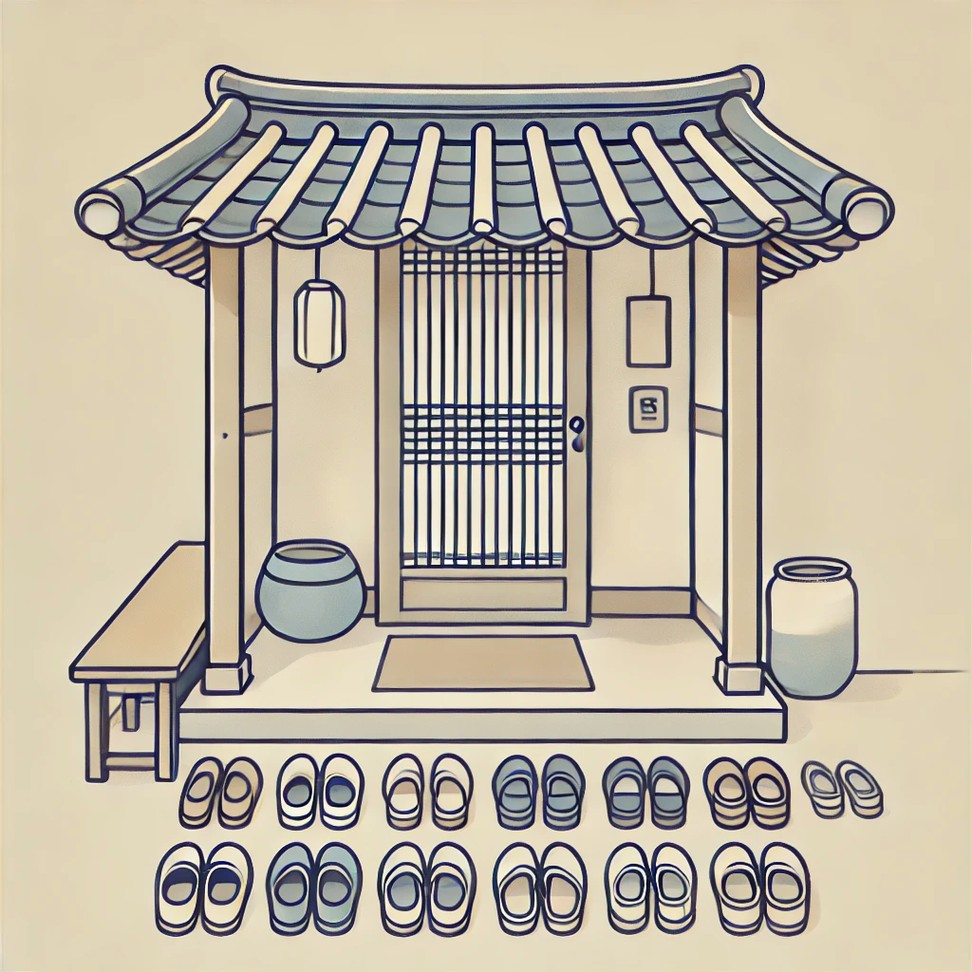[Image Source] AI illustration by DALL·E
TL;DR – When in Korea, do as Koreans do.
Whether you're greeting elders, riding the subway, or sharing a meal, Korean etiquette is built on respect, age hierarchy, and social harmony.
This post breaks down 10 must-know cultural customs for visitors—from removing shoes to using two hands when drinking.
Mastering these small gestures can make a big difference in how you're received in Korea.
Introduction
It may feel a bit cliché now since so many Koreans have introduced them already, but here are 10 small yet essential aspects of Korean culture that you should definitely know if you’re visiting or living in Korea.
Korea’s rich history and unique culture fascinate visitors, sparking both amazement and curiosity. This blog post introduces some essential Korean etiquette and manners that foreigners living in or visiting Korea often wonder about.
If you ever have the chance to visit Korea, take this as a fun opportunity to observe and experience these customs firsthand.
1. Greeting Etiquette
In Korea, greetings vary depending on age and social status.
– Meeting an elder or someone for the first time → Slightly bow your head and say “안녕하세요” (Annyeonghaseyo – Hello).
– Greeting close friends → A simple “안녕” (Annyeong – Hi) is enough.
– Handshakes → Traditionally, elders initiated handshakes, but nowadays, anyone can offer a handshake first.
📌 Tip: If you make eye contact with someone you know, nod or greet them with a smile. Simply passing by without acknowledging them may seem rude.
2. Dining Culture
Korean dining etiquette is both unique and fascinating.
– Free side dishes → Restaurants provide complimentary side dishes (banchan), often with unlimited refills, which many foreigners enjoy.
– Elders eat first → It’s polite to wait for the oldest person at the table to begin eating before you start.
– Quiet meals → Unlike in some cultures, making noise while eating is acceptable; in Korea, eating loudly is generally considered impolite.
📌 Tip: Sharing food is a significant part of Korean dining culture. It’s better to use a small personal plate when sharing a dish.
Also, Korea has no tipping culture, so there’s no need to worry about leaving a tip.
3. Public Transportation Manners
Korea’s public transportation system is known for its efficiency and convenience.
– Punctuality → Trains and buses operate strictly, and most services provide English translations for easy navigation.
– Free Wi-Fi → Many buses and subway stations offer free Wi-Fi.
– Boarding etiquette → Let passengers exit before boarding to maintain order and avoid collisions.
– Priority seats → Reserved for elderly passengers, pregnant women, and people with disabilities. If you must sit there, politely explain your situation—most people will understand.
📌 Tip: If you’re on a crowded bus or subway, prepare to leave in advance. Hesitating at the last moment could make you miss your stop.
4. Walking & Escalator Etiquette
– Walk on the right → In busy areas such as streets and subway passages, people generally walk on the right side.
– Escalator etiquette → Stand on the right side and leave the left side clear for people in a hurry.
5. The “Taking Off Shoes” Tradition
When visiting a Korean home or a traditional restaurant, it is customary to remove your shoes before entering. This practice is deeply rooted in Korean culture as a way to maintain cleanliness and show respect.
📌 Tip: Wear clean socks. Taking off your shoes is common in many indoor settings, and this small gesture is seen as a sign of good manners.
6. The Importance of Age and Titles
Age and social status significantly affect how people address each other in Korea.
– Friends use first names, but when speaking to elders or superiors, it’s common to use respectful titles like “사장님” (Sajangnim—boss) or “선생님” (Seonsaengnim—teacher).
– In workplaces, titles such as “선배님” (Sunbaenim – Senior) are often used to show respect.
7. The “Ppalli Ppalli” Culture
Korea is famous for its “빨리빨리” (Ppalli Ppalli) culture, which emphasizes speed and efficiency in daily life.
– Super-fast delivery → Food delivery typically arrives within an hour, and packages often arrive the next day.
– Orderly queuing → Koreans usually form orderly lines, though patience may wear thin in high-pressure situations.
This fast-paced culture allows people to enjoy highly efficient services with minimal waiting time, which can surprise many foreigners.
8. Dringking Etiquette
Drinking culture is an integral part of Korean social life. Follow these basic rules to show respect.
– Receiving a drink → Always use both hands when accepting a drink from someone, especially an elder.
– Turning your head → When drinking with elders, turn your head slightly away as a sign of respect.
– Casual drinking with friends → Drinking customs are more relaxed among close friends, but observing the atmosphere is still essential.
📌 Tip: While drinking is a big part of socializing in Korea, politely declining is okay. Most people will understand and respect your decision.
9. Personal Questions
Koreans may ask about your age, marital status, or occupation.
– The reason → These questions often come from curiosity and a desire to establish a closer relationship.
– Modern awareness → People are becoming more mindful of such questions. If you’re uncomfortable, politely steering the conversation in another direction is entirely acceptable.
10. Useful Everyday Tips
– Cleanliness matters → Korean streets and public spaces are generally clean, and littering is frowned upon.
– Bowing for respect → A slight bow is a polite way to express gratitude or say goodbye
Punctuality → Being on time is particularly important in professional settings.
❓ FAQ (Frequently Asked Questions)
Q1. Do I have to bow to everyone in Korea?
Not everyone, but it’s good practice to bow lightly when greeting elders, teachers, or strangers in formal situations. Among friends, a nod ora wave is enough.
Q2. Is it rude if I don’t take off my shoes at someone’s home?
Yes, it’s considered impolite. Always check at the entrance—most homes and some restaurants will expect you to remove your shoes.
Q3. Why do Koreans ask personal questions like age or marital status?
On Reddit and Quora, this surprises many foreigners. These questions often help Koreans determine how to address you respectfully. It’s not meant to be invasive—but you can politely redirect if it makes you uncomfortable.
Q4. Is it okay to say no to alcohol in Korea?
Absolutely. While drinking is a big part of socializing, most people will respect your choice if you decline politely.
Q5. What happens if I sit in a priority seat by mistake?
If someone in need boards, it’s best to stand up immediately. If you must use it temporarily, be ready to offer the seat without hesitation.
Final Thoughts
At first, Korean etiquette and culture may seem complex, but understanding and respecting these customs will enrich your experience in Korea.
Embrace the differences and enjoy the warmth and hospitality of the Korean people!
📍 Want More Like This?
Explore more posts in our Korean Culture Series and learn how to navigate language, etiquette, and hidden meanings in Korean life.
- 🔖 Understanding Korean Family Titles: Simplify Your Drama-Watching Experience
- 🔖 Korean Abbreviations Explained: A Guide to Modern Slang and Trends
- 🔖 55 Korean Proverbs You Need to Know: Language and Culture Insights
- 🔖 The Beauty of Korean Emotion Words: Learn to Speak with Feeling
- 🔖 Mastering Korean Honorifics: A Guide to Respectful Communication in Korean Culture


